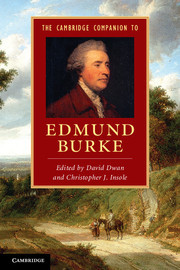Description
The Cambridge Companion to Edmund Burke
Cambridge Companions to Literature Series
Coordinators: Dwan David, Insole Christopher
This comprehensive and accessible Companion examines the life and writings of Edmund Burke, one of the eighteenth century's most influential thinkers.
Language: English
Subject for The Cambridge Companion to Edmund Burke:
The cambridge companion to edmund burke
Publication date: 10-2012
279 p. · 15.2x23.5 cm · Hardback
Publication date: 10-2012
279 p. · 15.2x23.5 cm · Hardback
The cambridge companion to edmund burke
Publication date: 10-2012
286 p. · 15.2x22.6 cm · Paperback
Publication date: 10-2012
286 p. · 15.2x22.6 cm · Paperback
Description
/li>Contents
/li>Biography
/li>
Edmund Burke prided himself on being a practical statesman, not an armchair philosopher. Yet his responses to specific problems - rebellion in America, the abuse of power in India and Ireland, or revolution in France - incorporated theoretical debates within jurisprudence, economics, religion, moral philosophy and political science. Moreover, the extraordinary rhetorical force of Burke's speeches and writings quickly secured his reputation as a gifted orator and literary stylist. This Companion provides a comprehensive assessment of Burke's thought, exploring all his major writings from his early treatise on aesthetics to his famous polemic, Reflections on the Revolution in France. It also examines the vexed question of Burke's Irishness and seeks to determine how his cultural origins may have influenced his political views. Finally, it aims both to explain and to challenge interpretations of Burke as a romantic, a utilitarian, a natural law thinker and founding father of modern conservatism.
Acknowledgements; List of contributors; Method of citation; Chronology; Introduction: philosophy in action; 1. Burke's life F. P. Lock; 2. Burke, Enlightenment and Romanticism Richard Bourke; 3. Burke as rhetorician and orator Christopher Reid; 4. Burke's aesthetic psychology Paddy Bullard; 5. Burke on law and legal theory Seán Patrick Donlan; 6. Burke on political economy Richard Whatmore; 7. Burke and religion Ian Harris; 8. Burke and the constitution David M. Craig; 9. Burke and the natural law Christopher Insole; 10. Burke and utility David Dwan; 11. Burke and the ends of empire Jennifer Pitts; 12. Burke and the American crisis Harry T. Dickinson; 13. Burke on India Frederick G. Whelan; 14. Burke on Ireland Ian McBride; 15. 'Reflections on the Revolution in France' Iain Hampsher-Monk; 16. Burke's counterrevolutionary writings Iain Hampsher-Monk; 17. Burke in the USA Seamus Deane; Further reading.
David Dwan is a lecturer in English at Queen's University Belfast. He is author of The Great Community: Culture and Nationalism in Ireland (2008) and has written a range of articles on intellectual history and modern literature.
Christopher Insole is Senior Lecturer in Theology and Ethics at the University of Durham, UK. He is the author of The Politics of Human Frailty: A Theological Defence of Political Liberalism (2005) and has written articles on Burke, Kant, philosophy of religion, epistemology and intellectual history.
Christopher Insole is Senior Lecturer in Theology and Ethics at the University of Durham, UK. He is the author of The Politics of Human Frailty: A Theological Defence of Political Liberalism (2005) and has written articles on Burke, Kant, philosophy of religion, epistemology and intellectual history.
© 2024 LAVOISIER S.A.S.




